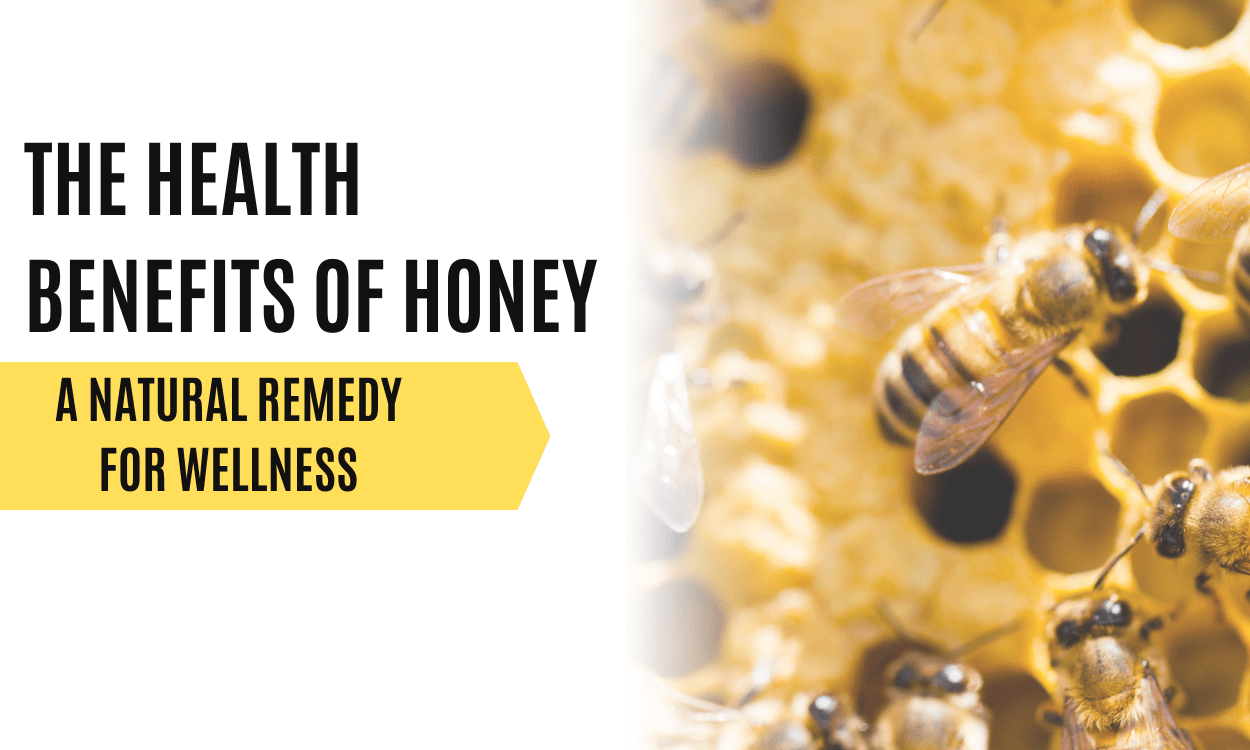

The Health Benefits of Honey: A Natural Remedy for Wellness
Introduction
Honey has been used for centuries as both a food and a medicine. This golden, viscous liquid, produced by bees from the nectar of flowers, is not only a natural sweetener but also a powerhouse of health benefits. Honey is rich in antioxidants, vitamins, and minerals, making it well regarded for its antibacterial, anti-inflammatory, and wound healing properties. In this article, we will explore the various effects of honey on human health, backed by scientific research and traditional wisdom.
Nutritional Profile of Honey
Honey is composed primarily of fructose and glucose, along with small amounts of water, pollen, enzymes, amino acids, and minerals such as calcium, magnesium, potassium, and zinc. It also contains antioxidants like flavonoids and phenolic acids, which contribute to its health-promoting properties.
Key Nutrients in Honey (Per 100g):
- Calories: 304 kcal
- Carbohydrates: 82.4 g
- Sugars: 82.1 g (fructose and glucose)
- Fiber: 0.2 g
- Protein: 0.3 g
- Vitamins: B6, niacin, riboflavin
- Minerals: Calcium, iron, magnesium, phosphorus, potassium, zinc
Health Benefits of Honey
1. Antibacterial and Antifungal Properties
Honey has been used since ancient times to treat infections due to its natural antibacterial properties. The high sugar content, low pH, and hydrogen peroxide produced by enzymes in honey create an inhospitable environment for bacteria.
- Manuka honey, a special type from New Zealand, contains methylglyoxal (MGO), which enhances its antibacterial effects.
- Studies show that honey can inhibit harmful bacteria like E. coli, Salmonella, and Staphylococcus aureus.
2. Soothes Sore Throat and Cough
Honey is a well-known remedy for respiratory infections and sore throats. Its thick consistency coats the throat, reducing irritation.
- The World Health Organization (WHO) recommends honey as a natural cough suppressant for children over one year old.
- Research suggests that honey is more effective than some over-the-counter cough syrups.
3. Wound Healing and Skin Health
Honey’s antibacterial and anti-inflammatory properties make it an excellent treatment for wounds, burns, and skin infections.
- Medical grade honey (like Manuka) is used in hospitals to treat ulcers and surgical wounds.
- It promotes tissue regeneration and reduces scarring.
- When applied topically, honey can help with acne, eczema, and dry skin.
4. Boosts Immunity
The antioxidants in honey help strengthen the immune system by neutralizing free radicals that cause cell damage.
- Regular consumption of raw honey may reduce the risk of chronic diseases like heart disease and cancer.
- Its antimicrobial properties help fight infections, especially during cold and flu season.
5. Aids Digestion and Gut Health
Honey acts as a prebiotic, promoting the growth of beneficial gut bacteria.
- It can help with digestive issues like acid reflux, gastritis, and stomach ulcers.
- A mixture of honey and warm water may relieve constipation and bloating.
6. Natural Energy Booster
Honey’s natural sugars offer a quick energy boost, making it an excellent choice for pre- or post-workout.
- Unlike refined sugar, honey releases energy gradually, preventing blood sugar spikes.
- Athletes often use honey to enhance endurance and performance.
7. Supports Heart Health
Honey may improve cardiovascular health by:
- Lowering bad cholesterol (LDL) and increasing good cholesterol (HDL).
- Lowering blood pressure through its antioxidant properties.
- Preventing plaque buildup in arteries.
8. May Help with Diabetes Management
Although honey contains sugar, some studies suggest it has a lower glycemic index (GI) than table sugar.
- Small amounts of honey may improve insulin sensitivity.
- Diabetics should consume honey in moderation and under medical supervision.
9. Improves Sleep Quality
Consuming honey before bed may promote better sleep by:
- Increasing serotonin levels, which convert to melatonin (the sleep hormone).
- Providing the liver with glycogen, preventing nighttime hypoglycemia.
10. Anti-Cancer Potential
Some studies suggest that honey’s antioxidants may help prevent cancer by reducing oxidative stress and inflammation.
- Research is ongoing, but honey shows promise in slowing tumor growth in certain cancers.
Potential Side Effects and Precautions
While honey is generally safe, some considerations include:
- Infant Botulism: Honey should not be given to infants under one year due to the risk of botulism.
- Allergies: Some people may be allergic to pollen in honey.
- High Caloric Content: Excessive consumption can lead to weight gain.
- Blood Sugar Levels: Diabetics should monitor intake carefully.
How to Incorporate Honey into Your Diet
- As a Sweetener: Replace sugar with honey in tea, coffee, or smoothies.
- In Baking: Use honey in cakes, cookies, and granola bars.
- For Skin Care: Apply raw honey as a face mask or wound dressing.
- Medicinal Uses: Mix with lemon and ginger for a cold remedy.
Conclusion
Honey is more than just a natural sweetener—it is a versatile remedy with numerous health benefits. From boosting immunity to healing wounds, its medicinal properties have been recognized for centuries. However, moderation is key, and individuals with specific health conditions should consult a doctor before using honey therapeutically. By incorporating high-quality, raw honey into your diet, you can enjoy its sweet taste while reaping its many health rewards.